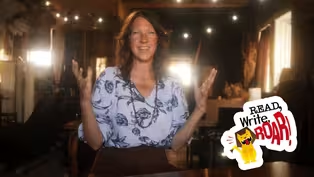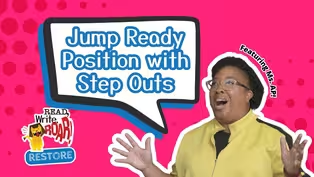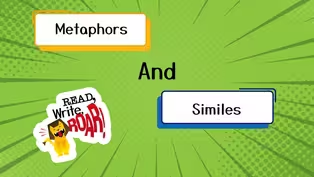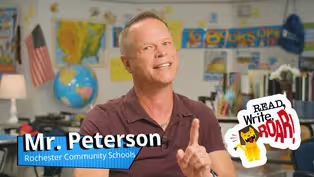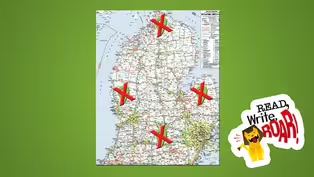Read, Write, ROAR!
Become a Citizen Scientist: Birdwatching Data Collection | Paul Roose | Read, Write, ROAR!
Clip: Season 1 Episode 1002 | 4m 30sVideo has Closed Captions
Be a citizen scientist with Paul Roose! Learn to observe, collect, and record data.
You don’t have to be a scientist to help gather important data! Join naturalist Paul Roose as he teaches you how to be a citizen scientist by observing birds, collecting data, and recording your findings. This video will walk you through everything you need to know to start contributing to real scientific research right in your own backyard!
Problems playing video? | Closed Captioning Feedback
Problems playing video? | Closed Captioning Feedback
Read, Write, ROAR! is a local public television program presented by Detroit PBS
Read, Write, ROAR!
Become a Citizen Scientist: Birdwatching Data Collection | Paul Roose | Read, Write, ROAR!
Clip: Season 1 Episode 1002 | 4m 30sVideo has Closed Captions
You don’t have to be a scientist to help gather important data! Join naturalist Paul Roose as he teaches you how to be a citizen scientist by observing birds, collecting data, and recording your findings. This video will walk you through everything you need to know to start contributing to real scientific research right in your own backyard!
Problems playing video? | Closed Captioning Feedback
How to Watch Read, Write, ROAR!
Read, Write, ROAR! is available to stream on pbs.org and the free PBS App, available on iPhone, Apple TV, Android TV, Android smartphones, Amazon Fire TV, Amazon Fire Tablet, Roku, Samsung Smart TV, and Vizio.
Providing Support for PBS.org
Learn Moreabout PBS online sponsorshipHi, I'm naturalist Paul Roos.
We are heading outdoors to appreciate Michigan birds and that reading and writing is everywhere.
Even though we may not see a bird, we can use our powers of observation to infer that birds are present and possibly nesting in an area.
Have you ever thought about how scientists research and gather information about birds?
The more we understand about a species, the more we can conserve and protect them.
There are also people who are nature data detectives.
These citizens are regular people like you and me, and can gather information that can be used by scientists.
Since scientists can't be everywhere and see everything all the time.
They rely on the eyes and ears of citizens all over the world to collect data.
These citizens are called citizen or community scientists.
Today we are going to practice becoming a citizen scientist.
Not only will we record what we see, but we're going to practice reading and writing information and charts and graphs.
So grab something to write with and a piece of paper and let's get started.
First, I'd like to show you an example of written observations I have previously made by bird watching in my yard.
As you can see in my hand, writing is messy.
If I want to share this information with others, I put it in a format that can more easily be understood and read a graph.
Graphs are filled with data and are a different type of text from which we can get information.
I have taken my notes and made a graph that summarizes the number of individual birds of different species I have seen in my yard.
Together, let's read the graph I made.
I've recorded five of the species in the graph.
What kind of bird did we see most often?
The house sparrow.
Are you ready to become a citizen?
Scientists.
And record some observational data with me.
Let's head over to my bird house, which has a house sparrow nest in it.
This is a special bird house that allows me to safely open it up to see inside.
Let's get our journals and start our work by writing down some questions together to guide our research.
Be sure to leave some space for writing after each question.
We are going to check in to our nest over the next several weeks.
Each time we check in, we're going to create a hypothesis in response to each question.
Then we record our observations.
Our first question is how many eggs will be laid?
I know from reading that most backyard birds lay 3 to 5 eggs.
What is your hypothesis?
My guess is four eggs will be laid this year.
Look, we have four eggs.
Now my next question is how many eggs will hatch?
I think four eggs will hatch.
Let's check back in about a week.
Now let's carefully look inside.
We have four baby birds.
Another word for a baby bird is a nestling.
Let's record our data and write down our next question and hypothesis.
How many birds will successfully leave the nest?
My hypothesis is four baby birds will leave the nest.
Now, it's been about two weeks since we first observe the house sparrow nests in the bird house.
The outcome is what happens to the nest lengths.
The only way to know for sure is to see it.
So if we open the bird house and all the nestlings are gone, we can infer that they left the nest.
What is the outcome of the nest?
Look, there are no baby birds in the nest.
Sometimes nestlings can be eaten by a cat or another predator.
But looking around, I can infer that the nestlings flew away.
Thanks for helping me read and write about the nest.
If you want to learn more about citizen and community science, a great place to start is by asking your teacher or local library for more information.
And then you can get started in your own backyard or neighborhood.
As a nature data detective.
Create a City Soundscape | Ms. Audra | Read, Write, ROAR!
Video has Closed Captions
Clip: S1 Ep1002 | 1m 52s | Join Ms. Audra as she helps you create a lively city soundscape! (1m 52s)
Read, Write, ROAR! Restore - Jump Ready Position with Step Outs
Video has Closed Captions
Clip: S1 Ep1002 | 1m 56s | Ms. AP guides you through a fun 2-minute movement snack focusing on leg movements. (1m 56s)
Similes & Metaphors: Making Your Writing Pop! | Ms. Meg | Read, Write, ROAR!
Video has Closed Captions
Clip: S1 Ep1002 | 3m 52s | Learn similes and metaphors with Ms. Meg! Make writing colorful and fun. (3m 52s)
The Toledo War | How Timelines Work | Mr. Peterson | Read, Write, ROAR!
Video has Closed Captions
Clip: S1 Ep1002 | 6m 20s | Explore the Toledo War with Mr. Peterson! Learn how Michigan shaped its borders. (6m 20s)
Why Michigan’s Capital Moved from Detroit to Lansing | Mrs. Mask | Read, Write, ROAR!
Video has Closed Captions
Clip: S1 Ep1002 | 6m 20s | Discover why Michigan's capital moved to Lansing with Mrs. Mask. Write an opinion! (6m 20s)
Providing Support for PBS.org
Learn Moreabout PBS online sponsorship

- Home and How To

Hit the road in a classic car for a tour through Great Britain with two antiques experts.












Support for PBS provided by:
Read, Write, ROAR! is a local public television program presented by Detroit PBS
